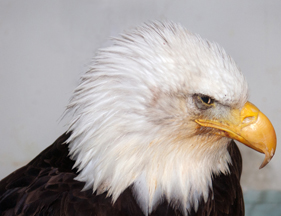
One of RWC’s recent bald eagle patients. Photo by Ron Kikel.
by Tracie Hornung
Rowena Wildlife Clinic recently got some good news: An injured bald eagle found this week in Hood River, Oregon, is not suffering from lead shot poisoning! See the story of its rescue in the Hood River News, written before tests showed the bird is free of lead.
However, bald eagles and other raptors are still not safe, especially since the new head of the Interior Department, Ryan Zinke, on his first day on the job signed an order to roll back a policy that would have kept lead out of wildlife refuges.
The policy Zinke reversed would have phased out lead ammunition and fishing tackle from national wildlife refuges by 2022. Lead is a powerful neurotoxin that persists in water and soil for years.
Birds are especially vulnerable to lead poisoning. Birds of prey eat animal carcasses that contain lead shot fragments — making lead poisoning an enormous threat for iconic species like bald eagles and California condors. And ducks and waterfowl rooting around the bottom of wetlands accidentally eat discarded lead.
Rowena Wildlife Clinic has often seen the effects of lead poisoning in raptors. In fact, just last winter, despite her best efforts Dr. Cypher lost a bald eagle to lead poisoning. Although no one could say with certainty how the eagle came to ingest the lead, it was a stark reminder that lead poisoning is an ever-present threat to wildlife.
Many hunters and fishers appreciate the necessity of protecting wildlife from lead. But others who complain that ammunition made of other metals cost too much compared to lead shot have won over politicians currently in office.
However, it isn’t just wildlife that suffer from lead poisoning. Humans who eat animals killed with lead shot are vulnerable, too, especially since it has a propensity to shatter into minute fragments. See this video from the Tulsa World.
A recent study found that children are even more susceptible to lifelong problems related to lead poisoning, including lower IQ, poor muscle coordination and damage to the nervous system, including kidneys, and/or hearing. See Kids’ Health for more information.
If we can’t convince politicians that wildlife are worth saving from the effects of lead, perhaps they will be more sympathetic to the human threat.
Columbia Gorge Discovery Center offers Earth Day presentation on non-lead hunting
Oregon Zoo’s Non-Lead Hunting Education director, Leland Brown, will present a program from 1 p.m. to 2 p.m. April 22 at the Discovery Center in The Dalles, Oregon, titled “Non-lead Hunting: Continuing a Tradition of Conservation.” Get more info here.

